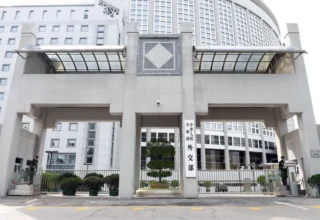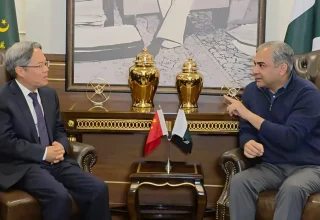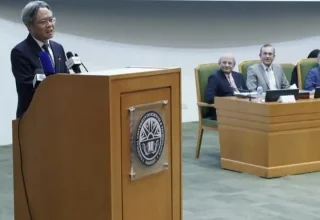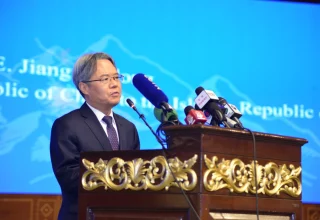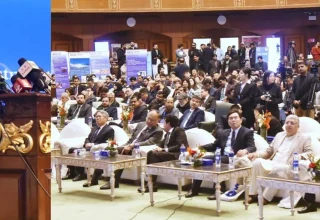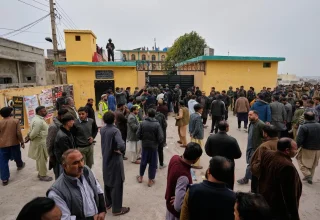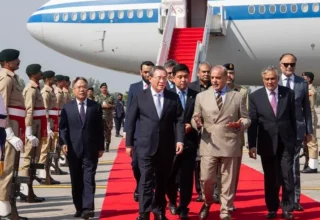
The recent visit of Chinese Premier Li Qiang to Pakistan ahead of the 23rd Meeting of the Council of Heads of Government of Member States of the Shanghai Cooperation Organization (SCO) in Islamabad marks a very important landmark in the exemplary bilateral relationship between two countries. As both nations are celebrating decades of longstanding partnership, this visit laid the blueprint for comprehensive bilateral cooperation and enhanced economic ties and a united front on global and regional affairs.
The bilateral relationship between Pakistan and China has been defined by mutual collaboration and support that is always referred to as “all-weather friendship.”. This strategic relationship has evolved through various phases of history, solidifying a foundation of shared goals and trust. Li Qiang’s visit is a testament to this enduring alliance, signaling both countries’ commitment to further strengthening their ties.
One of the very important aspects of the Chinese Premier visit was the emphasis on economic collaboration. The China Pakistan Economic Corridor (CPEC), a flagship project of Belt and Road Initiative (BRI), is serving as an exclusive example of this bilateral relationship. With Li Qiang’s engagements on expansion of CPEC projects including infrastructure, energy and digital connectivity, the visit has invigorated the momentum for significant investment in Pakistan.
With the successful completion of CPEC’s first phase, the project’s 2nd phase is emphasizing investment in information technology, agriculture and tourism, alongside the already established energy and infrastructure projects. The sector of agriculture is witnessing the introduction of modern farming techniques and better supply chain management, which can boost food security and enhance productivity. In the IT sector, investment is facilitating the growth of tech startups by promoting innovation and creating job opportunities for the talented youth.
In addition to it, the tourism sector is poised for a high boost with more efforts to develop basic infrastructure in scenic areas, attracting national and international visitors. This will not only boost cultural exchanges but will also stimulate the domestic economy.
The joint collaboration under the framework of CPEC signifies a high commitment to long term development with a win-win situation for both nations. With the rolling out of investment, this is aimed to enhance regional connectivity by fostering economic growth and positioning Pakistan as a pivotal player in BRI. The positive impacts of CPEC are aimed to pave the way for a prosperous and bright future of both sides.
The commitment of both nations to enhance economic ties is aimed to generate thousands of jobs for locals by boosting local industry and by improving living standards of the Pakistani public. Moreover, these investments are expected to increase Pakistan’s interaction into the global supply chain by positioning the country as a vital hub for economy, trade and commerce in the region.
Li Qiang’s visit also addressed critical regional security concerns, emphasizing the need for stability in South Asia. Both leaders reiterated their commitment to combating terrorism and ensuring regional peace. By strengthening military and intelligence cooperation, China and Pakistan can better address shared security challenges, fostering a more secure environment for both nations and their neighbours.
This partnership in security is particularly relevant in the context of Afghanistan, where stability remains a pressing concern. A secure and prosperous Pakistan is crucial for regional stability, and China’s support can play a pivotal role in achieving this goal.
Beyond economics and security, Li Qiang’s visit underscored the importance of cultural exchange and people-to-people connections. Both nations share rich histories and cultural heritage, and promoting mutual understanding is essential for a thriving partnership. Initiatives such as educational exchanges, joint cultural programs, and tourism promotion were highlighted during the visit.
These cultural ties not only enrich the relationship but also create a sense of shared identity and purpose among the younger generations in both countries. As students and professionals from China and Pakistan interact more, they foster a spirit of collaboration that will benefit both nations for years to come.
Li Qiang’s visit has a broader impact on the regional landscape as well. By strengthening ties with Pakistan, China is helping South Asia diplomatically, which can shift the balance of power in the region. This partnership presents a counterbalance to other powers, encouraging a multipolar world where diverse voices are heard and respected.
Moreover, enhanced cooperation between China and Pakistan can encourage other nations in the region to pursue similar partnerships. As the economic and security benefits of this collaboration become evident, countries in South Asia may seek to emulate this model, leading to a more integrated and cooperative regional framework.
On a global scale, the visit highlights China’s role as a responsible stakeholder in international affairs. By investing in Pakistan’s development, China demonstrates its commitment to promoting sustainable growth and stability in developing nations. This approach aligns with the United Nations’ Sustainable Development Goals, positioning China as a leader in global development efforts.
Furthermore, the visit serves as a reminder of the importance of South-South cooperation in addressing global challenges. As developing nations unite to tackle issues such as climate change, economic inequality, and health crises, the partnership between China and Pakistan stands as a model for collaborative action.
The visit of Chinese Premier Li Qiang to Pakistan is more than just a diplomatic engagement, it is a reaffirmation of a deep-rooted friendship that continues to evolve in a rapidly changing world. Through enhanced economic cooperation, a commitment to regional stability, and a focus on cultural exchange, this visit has laid the groundwork for a brighter future for both nations.
As China and Pakistan strengthen their bilateral ties, they are not only contributing to their mutual prosperity but also setting a positive example for international collaboration. The impact of this visit extends far beyond the two nations, offering a blueprint for a more interconnected, stable, and prosperous global community.
With a shared vision for the future, China and Pakistan are poised to navigate the challenges ahead, turning their partnership into a powerful force for good on the regional and global stage.
The writer is a renowned Sinologist and expert on global diplomacy and can be connected at zamirasadi@gmail.com














